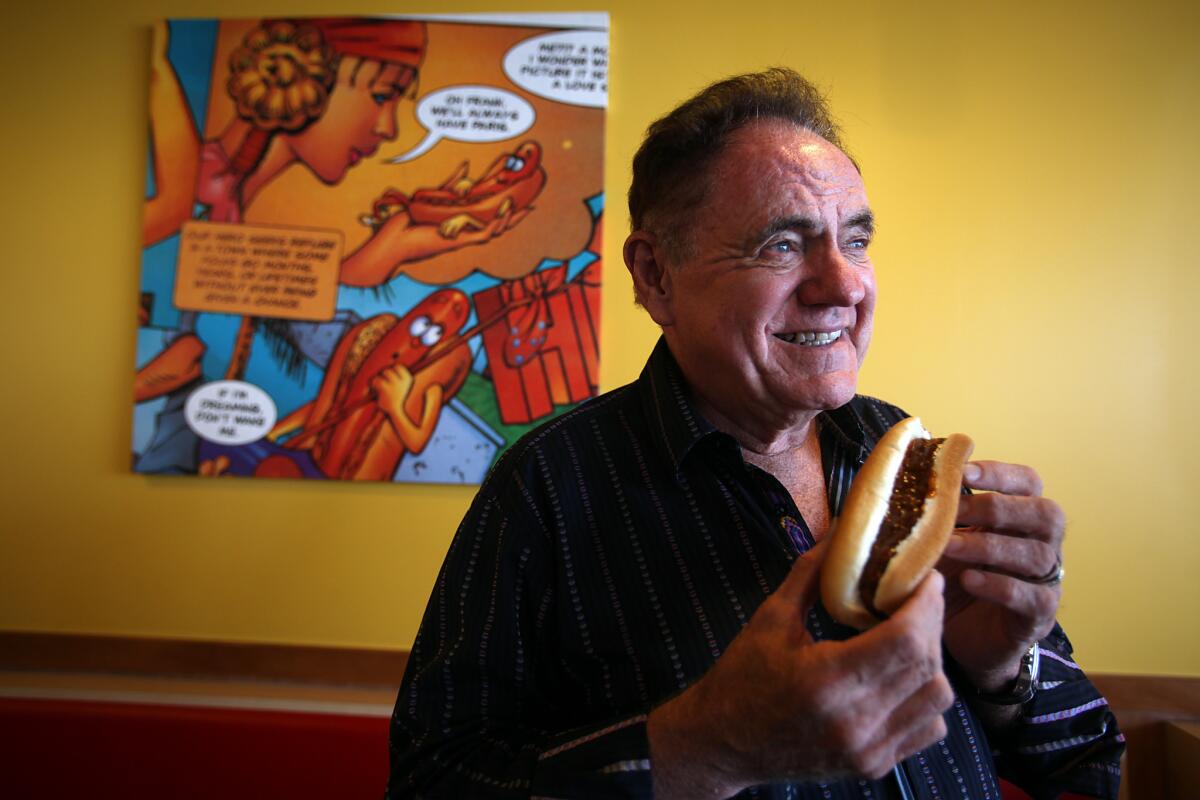John Galardi dies at 75; founder of Der Wienerschnitzel

- Share via
When John Galardi saw a man hosing down the parking lot of a modest Mexican restaurant in Pasadena, he asked for work. Galardi was young and broke, a college student freshly arrived from Missouri and looking for anything to help him scrape by.
It turned out that he asked the right man. Glen Bell Jr. was a young up-and-comer who liked the spark he saw in Galardi and mentored him for a few years while starting his eponymous chain, Taco Bell. Galardi, who was just another 19-year-old looking for a part-time job, went on to build his own fast-food empire, beginning in 1961 with an A-frame restaurant that he called, against his better judgment, Der Wienerschnitzel.
Galardi, the entrepreneur who made a fortune by topping the humble hot dog with chili, died Saturday at 75, according to a statement from his Irvine-based company, the Galardi Group. He had pancreatic cancer.
The company runs Tastee Freez and the Original Hamburger Stand but is best known for the business that sells more than 120 million hot dogs a year — more, it says, than any other chain in the world. It is now called Wienerschnitzel, dropping the “Der” in 1977.
Galardi said the name was suggested by Bell’s wife as she scanned a cookbook and came across a recipe for Viennese breaded veal cutlets, which have absolutely nothing to do with Wienerschnitzel’s chili dogs, its L.A. Bacon-Wrapped Street Dogs, or its Junkyard Dogs, crowned with chili, cheese, grilled onions and French fries.
“It was a stupid name,” Galardi told The Times in 2012, but people loved it. Wienerschnitzel has 350 stores in 10 states and Guam.
“One of the things that I think is really to Galardi’s credit is that he created a brand where no one had created a brand before,” said Dennis Lombardi, a fast-food industry consultant with WD Partners in Columbus, Ohio. “One of the issues is that hot dogs are so incredibly easy to make at home. He dressed up the hot dog and succeeded in providing a very crave-able product at very low prices.”
Galardi, in a 1984 Times interview, was frank about trying to distinguish Wienerschnitzel from its competitors.
“In this industry, we all have basically the same food, cooked in the same machines and sold by the same computers,” he said. “It gets down to a corporate identification and a couple of meat items.”
Not to mention the chili, which, in a 2012 commercial, he called “my secret weapon.”
Born on March 4, 1938, in Kansas City, Mo., Galardi grew up in a small-town atmosphere “playing basketball, chasing girls and working,” he told The Times. His father fixed appliances and his mother worked at Sears before moving, with Galardi and two of his brothers, to California.
Galardi briefly attended junior college in Pasadena but dropped out as he poured himself into the fast-food business. At 20, he worked double shifts managing a Taco Bell while his wife juggled three part-time jobs. With help from his parents, who borrowed on their furniture, he bought the restaurant for $12,000. Within a short time, he built his first Der Wienerschnitzel, in Los Angeles’ Wilmington neighborhood.
He said he ate two or three hot dogs a day, seven days a week, for more than six years as the managed his burgeoning operation.
He was among the first fast-food operators to set up a drive-through lane. The aim was to thin out the crowd of rowdy kids who were congregating at night in his parking lot.
“I’d walk out and sometimes find 100 kids drunk and chase them off,” he told the Orange County Business Journal in 1987. “I did a little survey and found out they were 100% of my problems and only 5% of my business.”
By the time Galardi was 25, he was a millionaire. However, like many successful entrepreneurs, he expanded his business too quickly and borrowed too much — problems he spent years correcting.
“I followed the advice of Wall Street,” he said. “I stopped making decisions and let other people do it. And I had to clean up the mess.”
Galardi stepped back from daily management of his privately run company in 1993. In the 1970s, he took a year off to ski in Aspen, Colo., and for many years divided his time between Aspen and Orange County.
A resident of Newport Beach, Galardi is survived by his wife, Judane, and four children.
More to Read
Start your day right
Sign up for Essential California for the L.A. Times biggest news, features and recommendations in your inbox six days a week.
You may occasionally receive promotional content from the Los Angeles Times.








